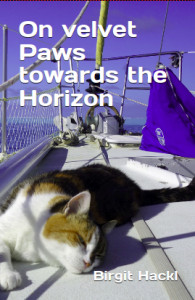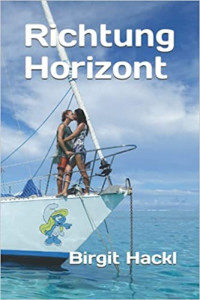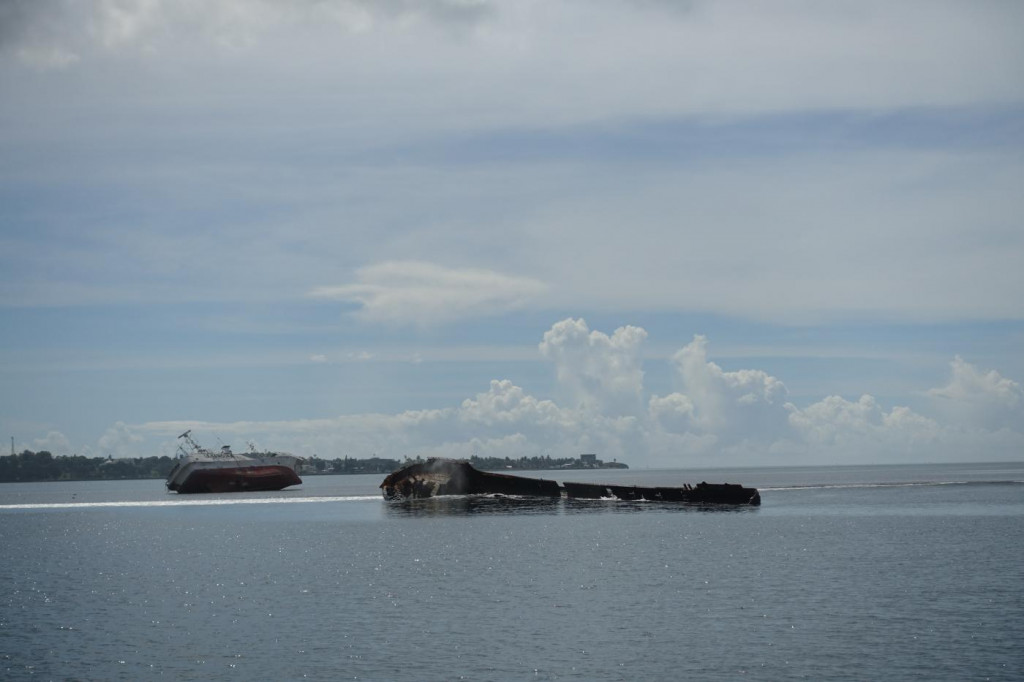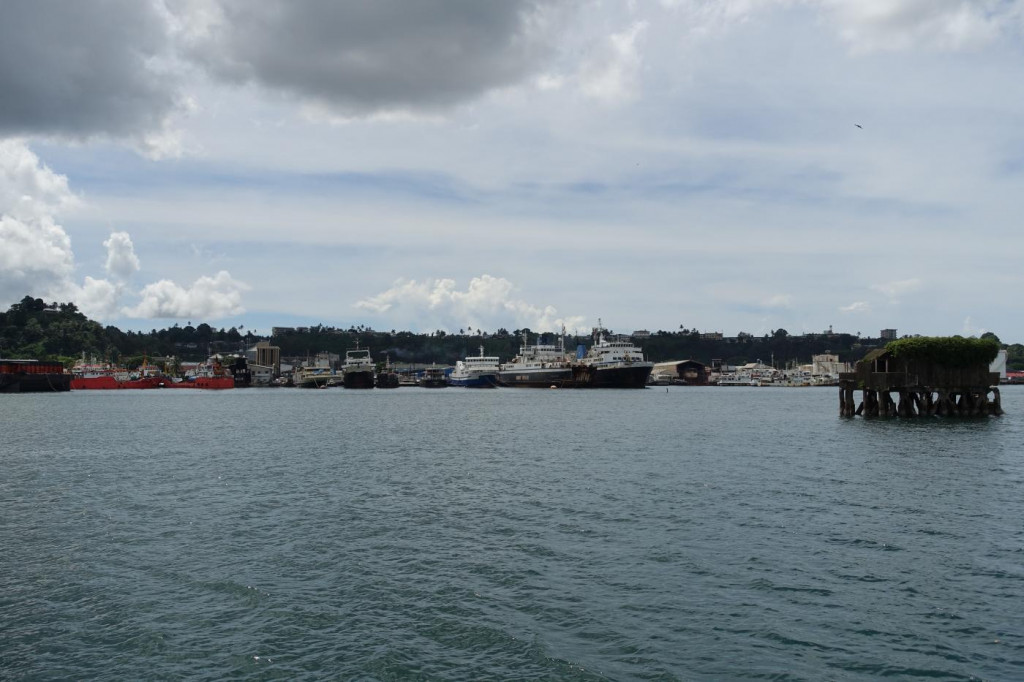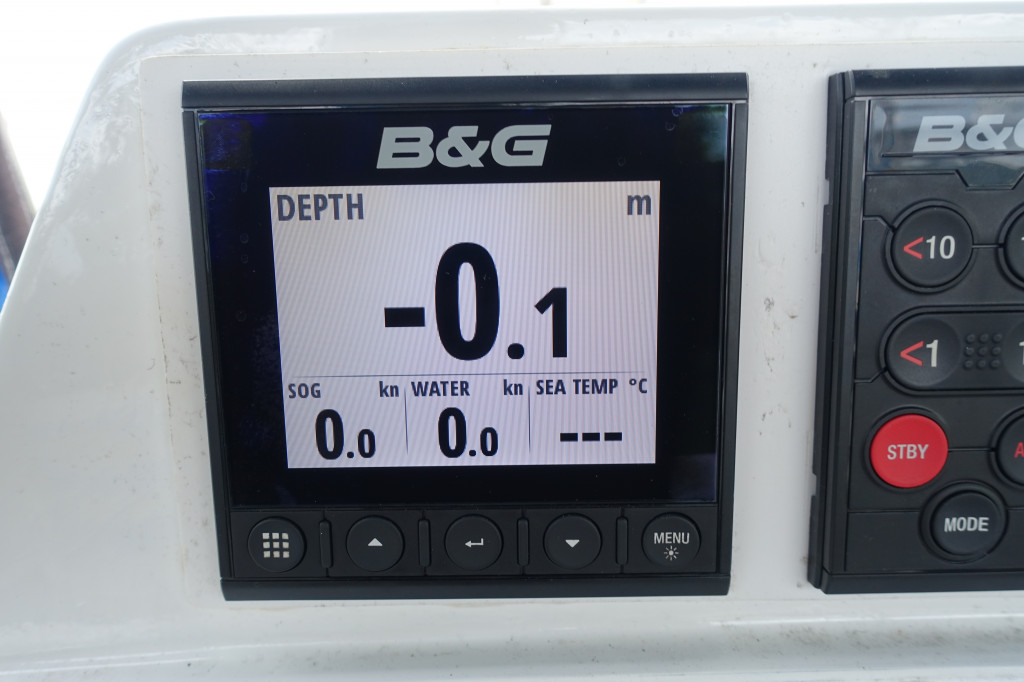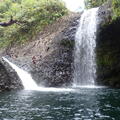Interestingly enough my 5 broken ribs and damaged lung are hardly giving me trouble, but my right elbow kept swelling up, so I had an ultrasound done yesterday and they discovered a tear in the triceps tendon. Having my right arm immobilised slows me down much more than the ribs. Being single-handed sucks ashore, but much more aboard. I cannot close overhead hatches when it rains, open the heavy lid of the fridge, or even pump the toilet, so poor Christian has to constantly lend me a hand. Worst for me though is writing with 5 fingers only ![]()
Luckily I can do dishes (and I HATE doing that) and I managed to wipe the ceiling with vinegar as mold started growing after a rainy week…
Fortunately we’re on a good mooring in a calm spot.
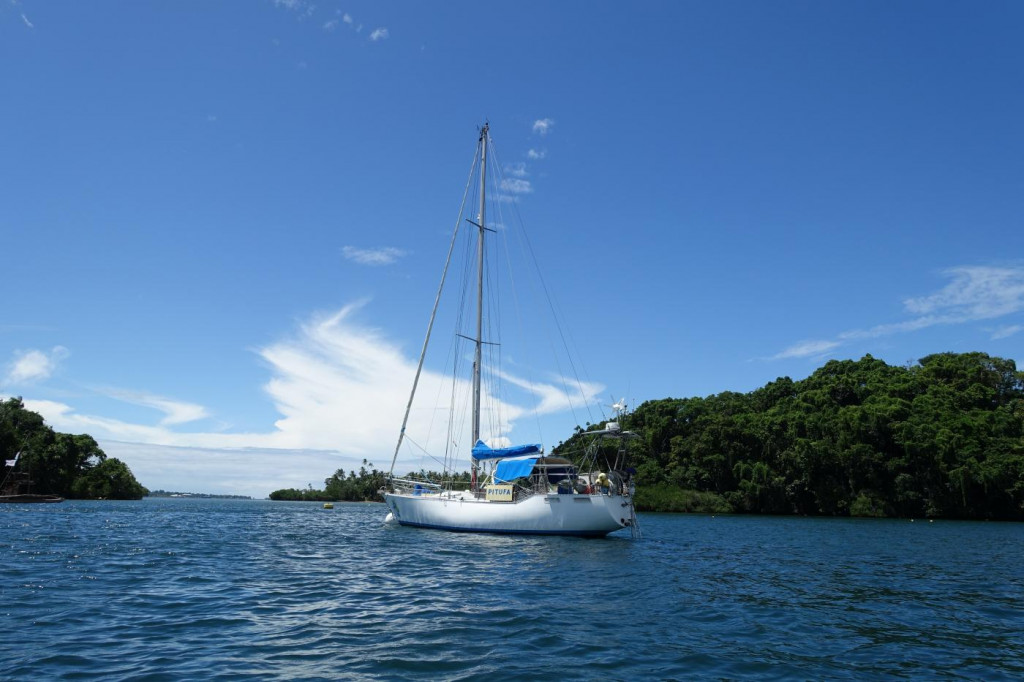
2023
21
Feb
Single-handed
2023
18
Feb
Medical miracle me…
Yesterday I had a CT-Scan done and when I took the CD back to the Pacific Specialist Healthcare centre, experienced Dr. Delasau couldn’t believe the images. “Looking at the scans I would schedule you for immediate surgery, but looking at you walking and talking like you do, I just say, keep doing what you’ve been doing!”
Turns out I have 5 broken ribs (broken in a line down the back where the boat’s side must have hit me when it crashed down on me with the breaking wave) and a “substantial” pneumothorax. Listening to my description of the events, the surgeon concluded that the right side of my lung must have collapsed during/after the ordeal when I could only gasp in shallow breaths and had no air to talk or scream. Somehow my body has healed itself during the last week to a degree that still looks scary on the scan, but enables me already to move around and have my first session of physio-therapy at the hospital!
Dr. Jack, the cardiologist I had visited earlier this month for a check-up, also wanted to see the scan and called me a “very tough lady” and my recovery “a miracle”.
Christian’s injuries are not quite so severe, but his shoulders still hurt badly, he can hardly lift his arms. Having to care for me doesn’t help him resting and recovering… Thanks smurfy-darling!
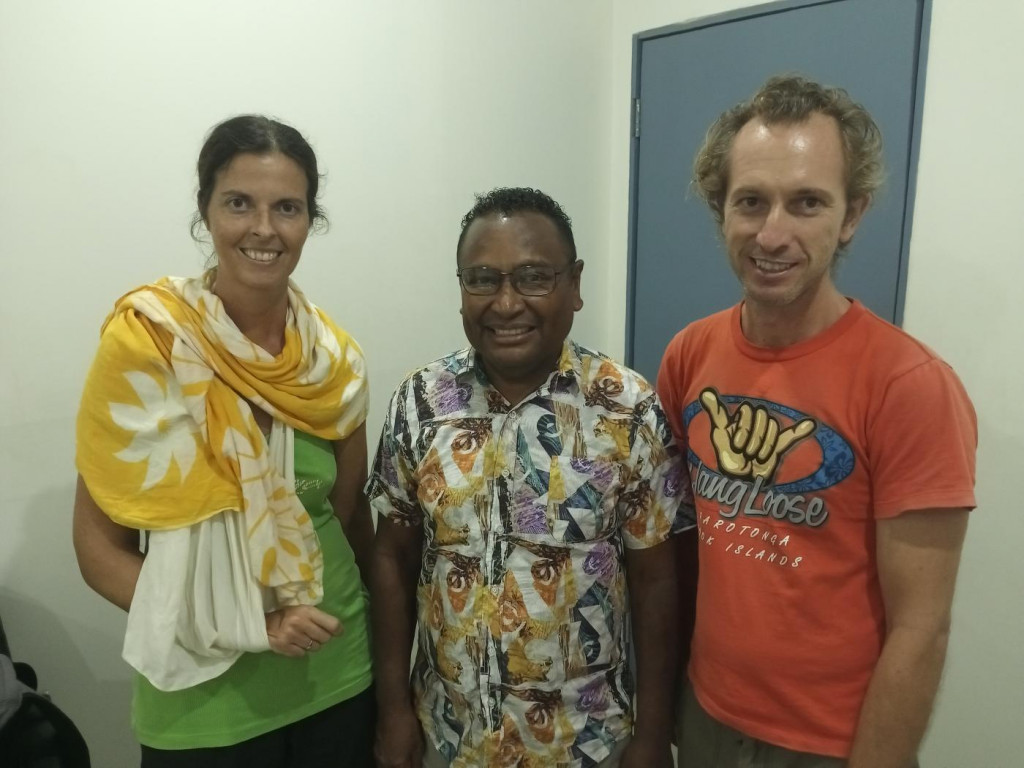
2023
15
Feb
Underway back to Suva
The passing cyclone left us with NW winds for the last few days, but today the wind swapped to the S and got light. We waited half a day for the seas to calm down, asked some local friends to help preparing Pitufa (dinghy up, poles out) and then headed out towards Suva. Birgit’s wedged in on the sofa and I’m single-handing an unfortunately rather rolly Pitufa as the seas are still quite rough.
2023
14
Feb
Survived!
Two days ago we nearly drowned. Our friend Maikeli (from the island of Matuku) did not make it. He was buried yesterday. We are sad, shocked and in pain. We did not go on a risky adventure, he just wanted us to take some underwater pictures of a reef pass put them in a report to the government about the installation of no-fishing Tabu zone there.
We were reluctant to go, the weather was overcast, we both had a cold, but we didn’t want to disappoint Maikeli and were eager to help with the good environmental intentions of our favourite island here in the Lau group. So we went down South to the Daku passage in his 24 ft open boat. Approaching the pass we saw that the swell was much higher than expected and we would never have taken our dinghy out in such conditions, but we thought Maikeli, who had spent all his 58 year on Matuku, knew how to judge the situation. The pass is short and exiting it on the ocean side, it became clear that the current wasn’t going in as we had thought, it was going out already because of the high swell! Additionally a current set us sideways, towards the breaking surf.
Suddenly this gigantic wave built up ahead of the boat–a 5 meter vertical wall. Maikeli gave full throttle, trying to climb it, but we had no chance. The boat was flipped backwards and crashed down on us together with tons and tons of frothing Pacific. Nobody who hasn’t been swallowed by such surf can imagine the panic of being whirled around, the thundering noise incredible loud, foaming turquoise everywhere, impossible to tell up from down, no more air, coming up coughing, struggling. Then the next wave breaking, the same struggle again and yet another one until we were back in shallower water on the reef. The capsized boat had righted itself, the anchor must have fallen out and so it anchored itself on the reef. Christian managed to climb up on it, shouting and waving for us to come, but Maikeli and I were grabbed by the current and swept out of the pass again, towards the Pacific and certain death. Looking back at Christian I thought that I was getting my last glimpse of him. It seemed so surreal, what a senseless way to die. This couldn’t be the end. My only chance was to swim sideways out of the 4 knot current. Maikeli was drifting next to me, holding on to the gasoline tank–that was the last time I saw him. I swam for my life, reached the breaking surf and got rolled and tossed across the reef again. Somehow I managed to reach the boat and Christian pulled me in, but we were still not safe. The boat was anchored in a precarious position: close enough to the drop-off into the pass to have a ripping current trying to suck us out and close enough to the outer edge of the barrier reef to have occasional waves breaking over the submerged boat–only the bow was sticking out and we were holding on to a line for dear life while I could feel broken ribs in my right side moving and grinding against each other. Christian was standing most of the time, looking for Maikeli, shouting, but no sign of him. We had to wait for another hour until a boat was passing by in the lagoon and spotted us.
They went back to Maikeli’s village Makadru first, we gave a breathless report and then were taken to Pitufa while the search for Maikeli was slowly organised. We washed our wounds and then Christian arranged cushions for me to lean/lie against on the sofa (where I’ve spent the last two days now). The doctor is currently in Suva and the hospital here has no x-ray machine anyway, but Ron, the friendly and very helpful nurse from the main village Yaroi, came to Pitufa, checked my vitals, agreed that at least 2 maybe 4 of my ribs are broken, put a bandage around my chest and supplied me with pain killers and antibiotics. As I’m able to breathe and not coughing blood it seems my lungs are okay. In the meantime Christian was called to shore twice to make phone calls to the police and navy to help organising a search, but it took another few hours until we could finally hear a search and rescue plane (or drone, we weren’t sure). During the night we were still hoping against hope, but in the morning Maikeli’s body was found.
It is simply ungraspable how quickly a routine excursion turned into a disaster. We are cautious, careful people, never have been in severe danger throughout the last 11 years of journey. To face death a few times in a row was a rattling experience. Our plans of leisurly cruising the Lau group are canceled, we have to sail to Suva as soon as the weather allows to get me to a hospital and then there’s a long path of recovery ahead–ribs heal very slowly (6 weeks our offline-wikipedia claims). Christian is also bruised all over, has hurt both his shoulders and is on pain killers as well. But we are certainly not complaining. Against all odds we are still here, still have each other.
2023
11
Feb
Recipes: Kefir
It’s simply great to have a milk-Kefir culture on the boat. Those little cauliflower-shaped buggers turn milk over night into something very similar to yogurt–no special temperature required, no special procedure. I just throw a bunch of them into a jar with (stirred-up powder) milk, the creamier the thicker the resulting yogurt. About 12 hours later the yogurt is forming, but still a bit liquid and mild. 12 more hours in the cupboard and the yogurt has turned thick with the liquid separated below.
Depending on how thick/creamy I want, I stop the process sooner or later. I pour off the transparent liquid and strain the creamy part through a mosquito net into another jar. The yogurt slips through, the little kefir balls remain in the net.
I rinse them (still in the net) under running water, stir up a new cup of milk, throw them in and they get to work immediately again!
If I want to slow down the process, I put the milk jar into the fridge, there they still make yogurt, but take much longer.
If I want to take a break (e.g. when not on the boat) I put them into very watery milk, container into the fridge and they go to sleep until I wake them, rinse them, put them into creamy milk and let them play in warm temperatures again (you can tell that those easy-going, low maintenance thingies have something like a pet status on Pitufa ![]() )
)
Kefir is perfect for smoothies, yogurt dips and to replace yogurt in pies, etc. According to Wikipedia “milk kefir (to distinguish it from water kefir) or búlgaros, is a fermented milk drink made with a yeast/bacterial fermentation starter of kefir grains, that originated in the Caucasus Mountains of West Asia.”
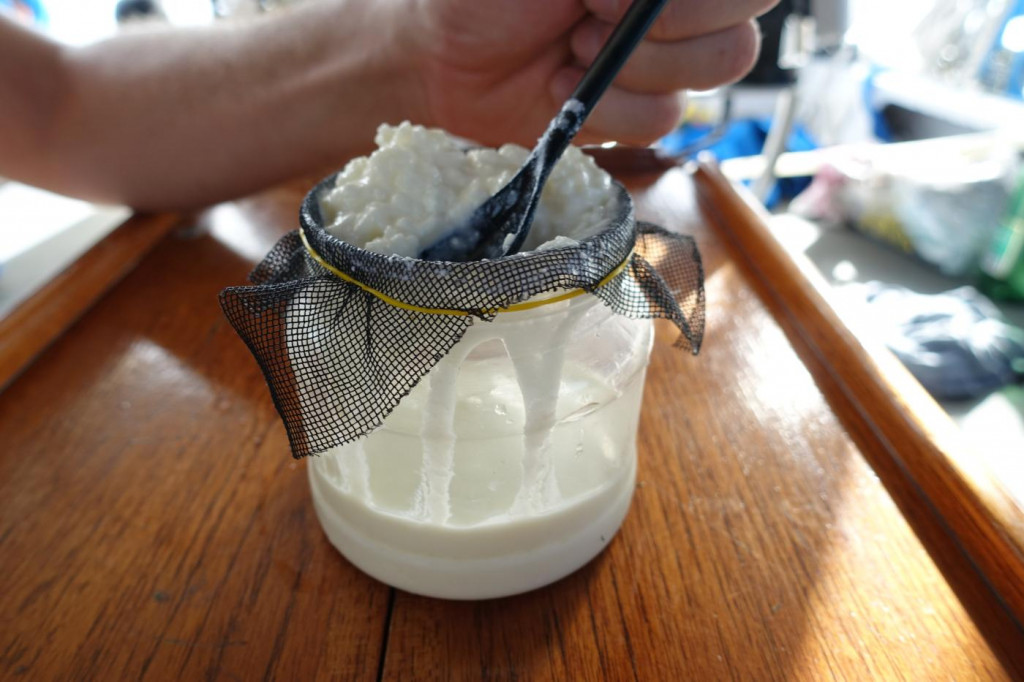
2023
08
Feb
Shopping frenzy
Shopping for basic things is really cheap in Suva, so we stocked up for the next few months, but then we got carried away with all the special, imported goodies at the posh supermarkets… With some searching there’s everything available here, even gluten-free products and smelly cheese ![]() Of course we also stocked up on boat repair/maintenance parts and then we did a last round buying some things for our friends out on the islands!
Of course we also stocked up on boat repair/maintenance parts and then we did a last round buying some things for our friends out on the islands!
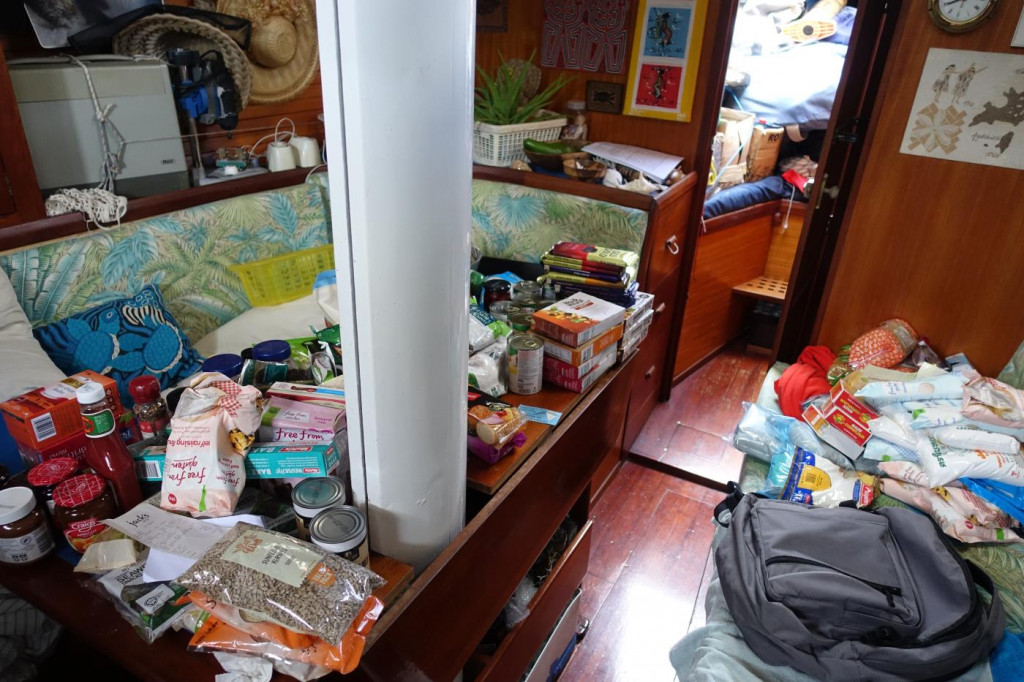
2023
05
Feb
Photos of Fiji’s capital Suva

Suva, Fiji
Suva is an ideal stop-over to stock up on provisioning with cheap supermarkets and market as well as well-stocked hard-ware stores and posh supermarkets with a wide array of goodies. We stayed there two weeks, renewed our visa and did way too much shopping.
(24 photos)
2023
04
Feb
Visa in Fiji
As we’re staying a longer time in Fiji than most yachties, we have to renew our visa. First we got 4 months (clearance fees are about 160 USD), then we applied for an extension, which costs about 40 USD (per person), but is only valid for 2 months. After those initial months we had the choice of either getting another extension (more pricey, 290 USD per person) or clear out of Fiji, sail up to Wallis and Futuna and return to start a new clearance and visa cycle.
We were really tempted to sail, see Futuna and save some money, but it’s the middle of the cyclone season and we are just having a rather active weather phase, so in the end we decided to go for the 6 month’s extension.
Reading cruiser’s reports we were worried that it would be complicated to do the application, but it’s very straightforward. You go to https://www.immigration.gov.fj/ and fill in the online form.
For the first 2 month extension we had to do the “visitor’s permit extension” which requires
- an informal letter requesting the visa
- the filled in form
- custom’s and immigration clearance
- itaukei cruising permit
- passport copy
All went well with the upload, but the next step is to do an online payment–credit card doesn’t work, it has to be a bank transfer… Doing the transfer from a European account would mean higher fees than the actual transfer sum and we couldn’t simply go to a bank to do the transfer for us, as there are no banks in Vanua Balavu (from where we tried to do the application). In the end a helpful local did the transfer for us. All done, it took a few weeks until we got the confirmation of payment, then nothing happened over the Christmas holidays and our visa were long expired, when we phoned to inquire about the status. “All done, you’ve been approved” was the friendly answer–they had just forgotten to write an email.
The 6 month extension is called “Residence permit for yachtees” (yes, with two ees) and requires uploading the same documents as the other one. We were quite surprised when the online form demanded a medical report and a police report as well and would not let us send the form off without uploading those. I called the immigration office in Suva: “Yes, there’s a mistake in the form. Simply upload a blank pdf instead” — problem solved the Fijian way. This time we were in Suva, so we simply went to a local bank with cash in hand and did the transfer from there. All done, no big deal and we’re legal until past the end of the cyclone season again ![]()
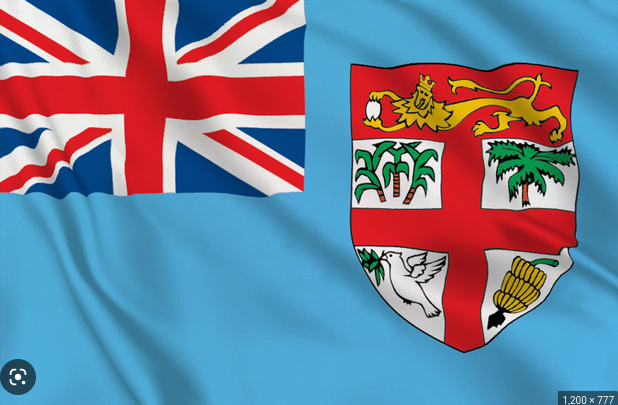
2023
01
Feb
Breadfruit season
It’s breadfruit season around the Pacific and we love it! When used green breadfruit tastes a bit like potato and can be used in potato dishes, but it has a creamier texture and a nutty flavour. We steam it first (takes only about 20 min), then make breadfruit fritters, tortilla espanola, salad, curries, stews etc.
Yesterday I mashed freshly steamed breadfruit and mixed it with eggs, to get a smooth dough for breadfruit gnocchi–I fried them, but boiled they would work as well. We had them with an Italian-style eggplant/tomato sauce and fresh basil from the boat garden ![]()
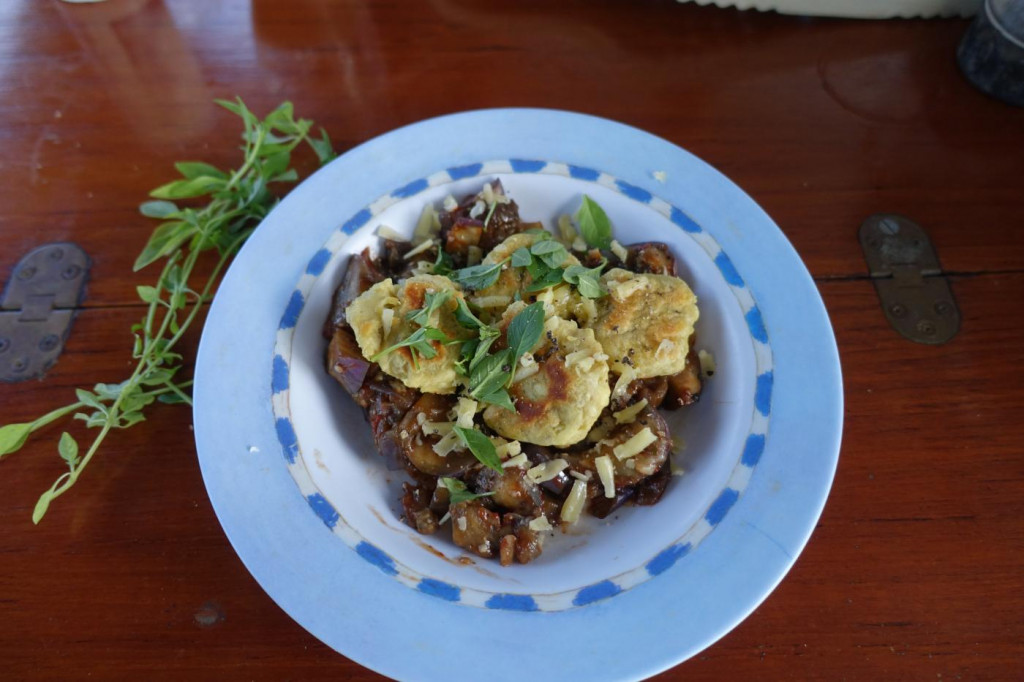
2023
01
Feb
2023
29
Jan
Project weekend
After a week in bustling Suva we headed out for an anchorage just round the corner, out on the reef in clear water, to get away from it all and relax a bit. Or so we thought. We only had two tasks on the to-do list: changing the gear oil on the outboard and sewing a new hatch cover to replace a torn one.
But then the fridge suddenly acted strangely–orange alert!! Fortunately it turned out to be only a cable issue, but that still meant half a day of pulling cables through the bilge–tons of fun in steaming 33°C. Today we tackled the outboard issue (after putting up a shade over the aft deck) and of course things turned more complicated than expected and we ended up working from early morning until 3 in the afternoon in the sizzling sun while apocalyptic clouds were building up over the shore. We finished just in time before the downpour!
The hatch cover has to wait for another day…
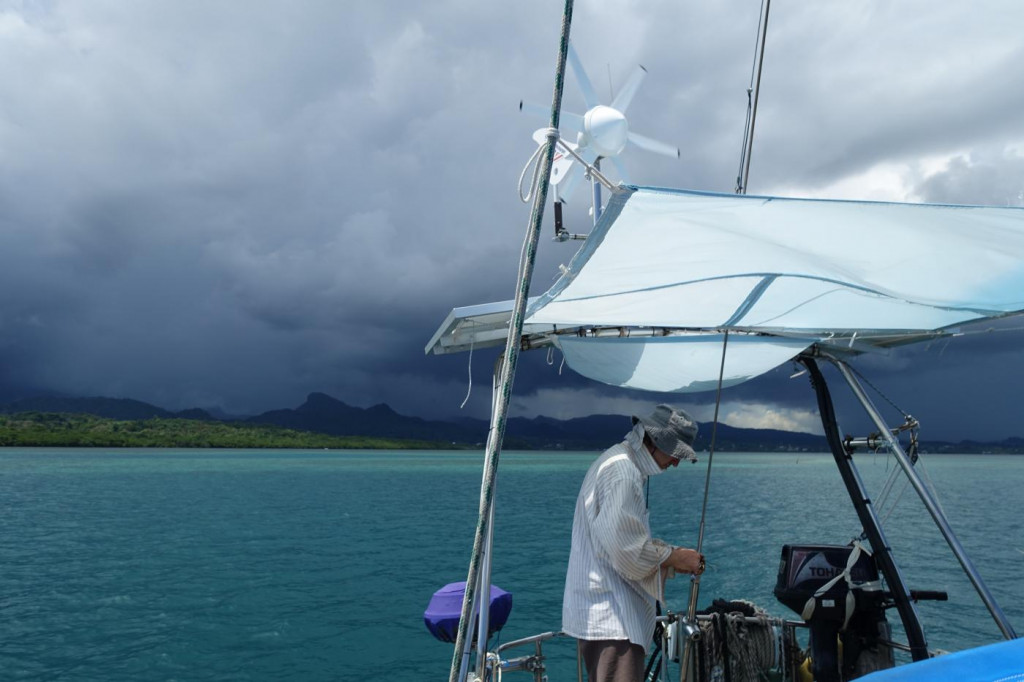
2023
22
Jan
Work routine
We love exploring, but sometimes it’s good to just settle down in a comfy place and go into work-mode. We were in Vanua Balavu for three weeks and fell into our usual work routine–easy without distractions as there are no other cruisers here and the next village is miles away. Christian was working on an experimental set-up to make the Pitufino work with the old Seatalk system, so he was blocking the whole salon table with his electronics board, lots of boxes with tiny parts, a soldering station and a magnifying glass (that looks a bit like Pixar’s animated lamp “luxo jr.”), so I alternated between the sofa and the aft cabin with my laptop while writing articles and new chapters for the sequel of “Sailing Towards the Horizon”.
Today we have set out again to sail to Suva for some shopping and to renew our visa!
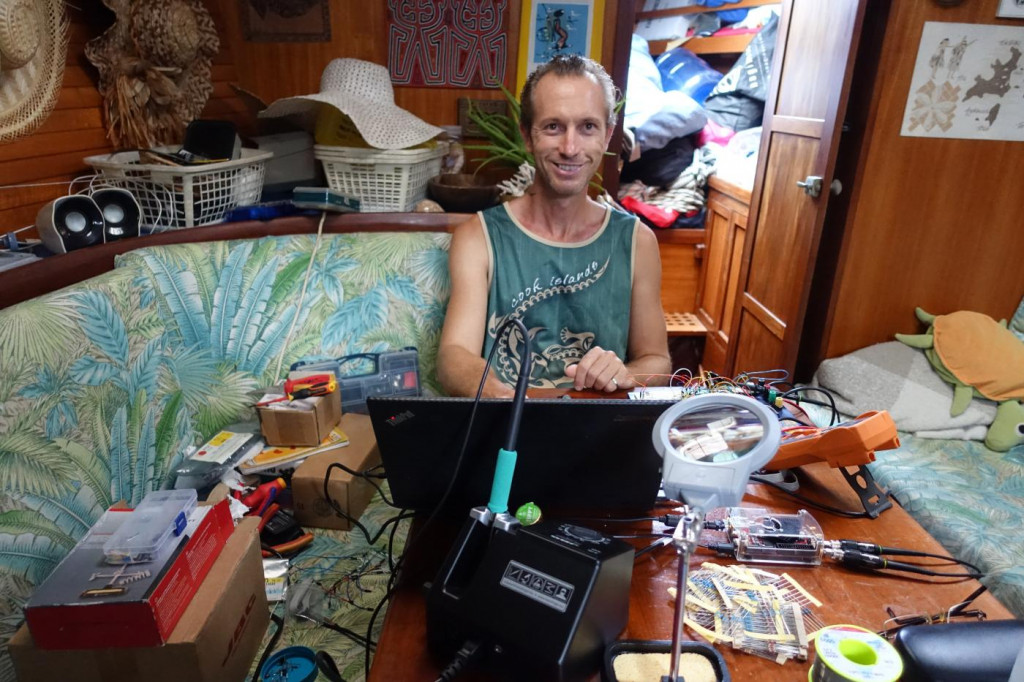
2023
22
Jan
Barking?
We couldn’t believe our ears when we heard barking ashore. Not a sound like a little yuppy dog would make, but a huge specimen, like a Saint Bernard dog… The next village is miles away, the islands are nearly impossible to climb with their overhanging shores and horribly spiky – had some lunatic abandoned his dog here? Then we heard more barking from the neighbouring island and yet another one?!
Glad that we didn’t have to venture out on a mission to save a dog, we opened our wikipedia and soon found an extremely unlikely source of the strange sound: a pigeon!
“The barking imperial pigeon (Ducula latrans), also known as Peale’s imperial pigeon, is a species of bird in the pigeon family Columbidae. It is endemic to Fiji, where it occurs on most of the medium and large islands. Its natural habitats are mature tropical moist lowland forests and tropical moist montane forest.”
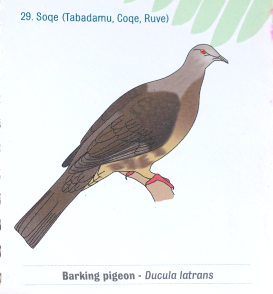
2023
17
Jan
Coral above and below the water
The strange landscape here in Qilqila on Vanua Balavu is a result of the volcanos here on the Pacific rim: former reefs and coralheads were raised by tectonic activity and are now forming sheer cliffs and a maze of tiny islands. Why the cliffs aren’t all the same height (like on other raised atolls) seems mysterious–maybe there were different tectonic events over time… The spiky coral structures are overgrown by an incredibly hardy vegetation–some trees cling to the bare, vertical rock! Over the centuries the waves have gnawed on the rocks and eroded them to a point where the shores have impressive overhangs, giving the “mushroom islands” their typical shape. In the meantime new coral has grown below, so now we see coral skeletons above and pretty reefs below the surface.
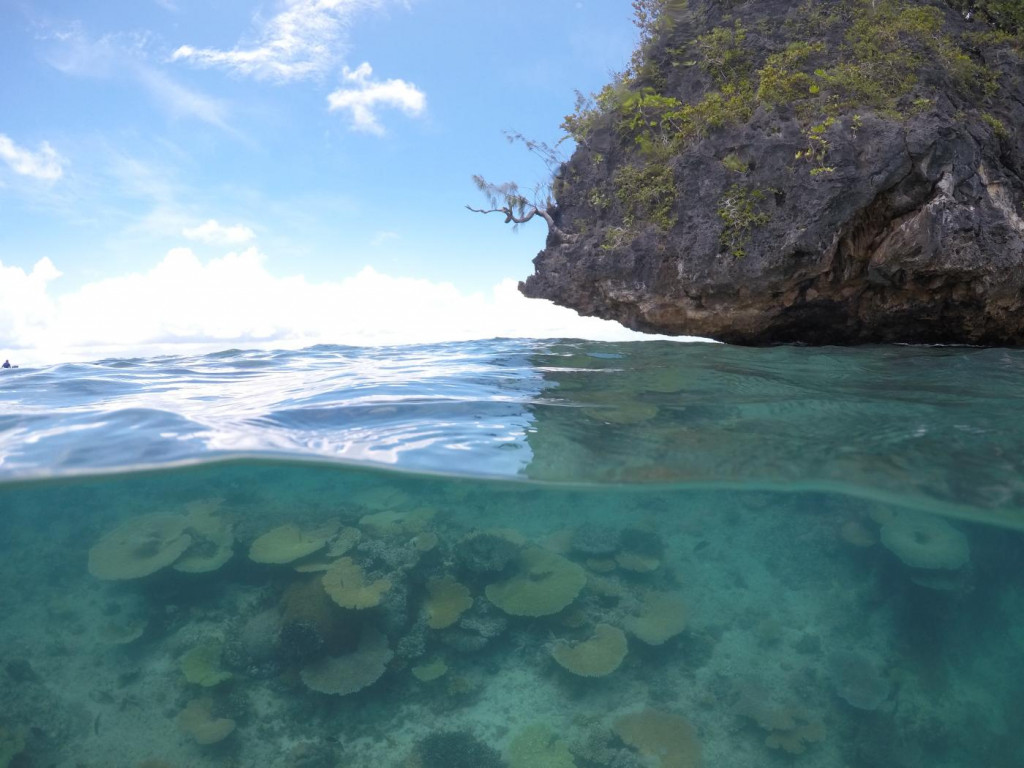
2023
14
Jan
Photos of Taveuni
Fiji's third biggest island features rainforest and lots of waterfalls. The main sight ashore for nature lovers is the Bouma national, which is located on the east side of the island and therefore impossible to reach by boat in tradewind conditions. We got lucky and enjoyed a full week exploring this rugged shore-line in NW wind!
(29 photos)


